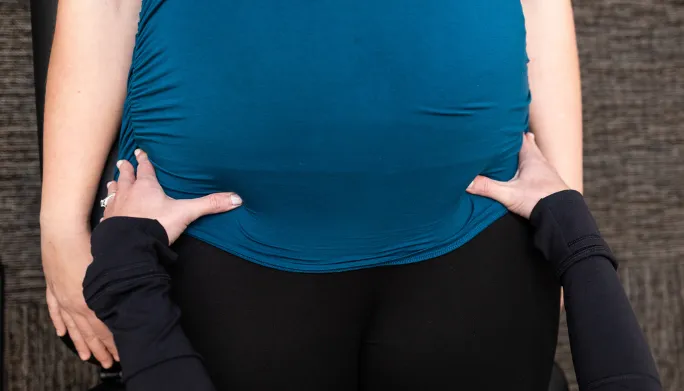Written By: Dr. Hyerim Kim, PT, DPT
We’ve all been there. It’s uncomfortable and painful, you’re bloated, and you wonder where all the food is going since it’s not coming out… for days!
Although everyone has different elimination schedules, the textbook definition of constipation refers to having less than 3 bowel movements in a week. These bowel movements consist of small amounts of hard and dry stool. Constipation includes straining or pain when passing stool, feeling of incomplete emptying, feeling that your rectum is blocked, and/or needing to use a finger to pass a stool physically.
How does constipation affect the pelvic floor?
Chronic constipation can lead to pelvic organ prolapse from straining, damage/weaken the muscles and nerves, cause bladder and fecal incontinence. When the rectum is blocked or full, it can push onto the bladder causing retention, leaking or urgency which refers to needing to urinate frequently/immediately. Constipation and pelvic floor are friendly neighbors, they are often associated with one another.
How does our pelvic floor affect constipation?
Conversely, pelvic floor dysfunction can lead to constipation. Having a tight pelvic floor can cause difficulties passing stool due to pain and inability to relax and lengthen the pelvic floor to pass stool can lead to constipation. Poor coordination such as contracting your pelvic floor when it should be relaxing can also lead to having difficulty eliminating bowel movements.
How can pelvic floor therapy help?
Pelvic floor therapy can help with constipation by:
- Releasing tight and/or painful pelvic floor muscles by performing internal manual mobilizations so you can relax and lengthen your pelvic floor muscles.
- Teaching you how to relax your pelvic floor so you can poop successfully without strain and pain!
- Breathing techniques to avoid straining and putting pressure on your pelvic floor.
- Visceral mobilization: gentle hands-on technique that improves mobility and reduces restriction of the fascia/connective tissue surrounding the organs, allowing everything to move and glide smoothly.
- Abdominal massage (I Love U’s): circular hands-on massage following the digestive tract in the shape of the letter I, L, U to help stool move to the rectum and increase movement. AKA “THE POOP MASSAGE”
- Cupping the abdomen improves blood flow, which can reduce pain, inflammation, and bloating.
There are other many causes of constipation which include the following:
- Medications
- Lack of exercise
- Change in environment such as traveling
- Slow intestinal movement/motility
- Not enough liquids and or fiber
- Not enough good bacteria in the gut
- Laxative abuse
- Pregnancy
- IBS, multiple sclerosis, nerve dysfunction/dmg, Parkinson’s
Constipation relief remedies:
- Fiber, aim for 20-35 grams of fiber a day. High-fiber foods: lentils, figs, sweet potatoes, beans, figs, chia seeds, flax seeds, psyllium, nuts, fruits with skin, whole grains, vegetables such as beans, broccoli, and carrots.
- Water water water! Having a glass of warm water in the morning will help initiate peristalsis which moves food through your digestive tract.
- Exercise. Light intensity such as walking, swimming, and biking will help circulate blood flow and the digestive system moving.
- Probiotic fermented foods such as yogurt, kefir, sauerkraut, kimchi, and kombucha for a healthy, diverse, and happy gut microbiome.
- For my shorties out there use a squatty potty! When sitting on the squatty potty, it will bring your knees closer to your chest which will “unkink” the puborectalis muscle (the muscle that hooks around your rectum) allowing pooping to be easier.
- Cut out dairy and processed foods and eat whole, natural foods as much as possible for fiber and nutrient content.
- Magnesium citrate supplement.
- Over-the-counter laxative and stool softeners if prescribed by your provider.
If you are experiencing pain, poor coordination of relaxation, bearing down of your pelvic floor muscles, prolapse, bladder or fecal incontinence, incomplete emptying, and pain with passing bowels or constantly straining, you may have a pelvic floor dysfunction. Please call and schedule an appointment with us at Reborn Pelvic Health & Wellness 801-702-8475. We are here to help you!
Work cited:
“Constipation.” Mayo Clinic, Mayo Foundation for Medical Education and Research, 20 Oct. 2023, www.mayoclinic.org/diseases-conditions/constipation/symptoms-causes/syc-20354253.
Restivo, Jenette. “8 Ways to Get Constipation Relief.” Harvard Health, 10 Aug. 2023, www.health.harvard.edu/staying-healthy/8-ways-to-get-constipation-relief.
West, Helen. “Https://Www.Medicalnewstoday.Com/Articles/318694.” 13 Home Remedies for Constipation, www.medicalnewstoday.com/articles/318694.


